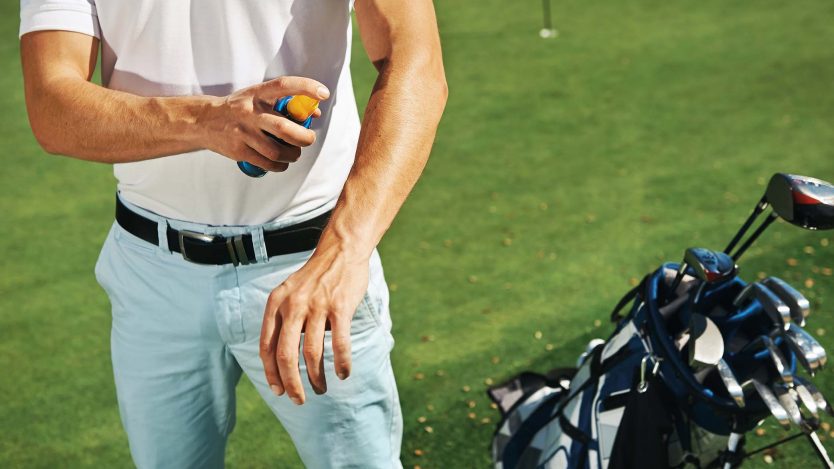Global rates of skin cancer are at epidemic levels and golfers are particularly at risk. A new campaign from Melanoma Fund is trying to raise awareness. So how can you play your part?
Perhaps you want a tan, perhaps you don’t want to get your grips greasy, perhaps you just don’t think it’s a problem.
We all know the players, the members or visitors to our clubs, that refuse to put sunscreen on before getting out for their round of golf.
Maybe that person is you? But you don’t have to get burned to damage your skin and as many golfers still refuse to heed the message about the importance of covering up they are storing up potentially huge problems for their future health.
Did you know skin cancer is more common than all others put together? And golfers, a group that habitually refuses to wear sunscreen, are at the highest risk.
Global rates of skin cancer are increasing all the time. Between two and three million non-melanoma skin cancers, and 132,000 melanoma skin cancers, occur worldwide every year.
Awareness campaigns keep pumping out the message but, despite their efforts, incidences have trebled over the last three decades. The trend shows no signs of slowing down.
The Melanoma Fund’s Slip! Slap! Swing! Campaign, supported by nine of the UK’s leading golf organisations, including the GCMA, is urging golfers to take sun protection more seriously.
It’s a golf specific drive, using social media and posters in locker rooms, to try and change habits and club managers can play a vital role in spreading the word.
Why is it so important? We asked Michelle Baker, chief executive of Melanoma Fund, to explain…
What is skin cancer?
Skin cancer is mainly caused by over-exposure to UV light – in particular sunburn – which causes a mutation in the DNA of skin cells.
This is both from ‘normal’ day-today exposure when outside, such as playing sport, as well as from sunbathing or sunbed use.
What kinds of skin cancer are golfers at risk from?
There are three main types…
- Basal Cell Carcinoma (BCC)
- Squamous cell carcinoma (SCC)
- Melanoma
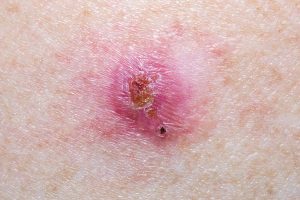 Basal Cell Carcinoma (BCC) is a cancer of the basal cells and accounts for around 75% of all skin cancers in the UK. Most BCCs are very slow growing and rarely spread to other parts of the body.
Basal Cell Carcinoma (BCC) is a cancer of the basal cells and accounts for around 75% of all skin cancers in the UK. Most BCCs are very slow growing and rarely spread to other parts of the body.
Occasionally, some BCCs are aggressive and, if left untreated, may spread into the deeper layers of the skin and sometimes to the bones. That can make treatment difficult, so it’s always best to catch them early.
Initially, a BCC can take the appearance of a small ‘pearly’ bump, similar to a flesh-coloured mole or a pimple that doesn’t go away. They can look dark, shiny pink or appear in the form of red patches that are slightly scaly.
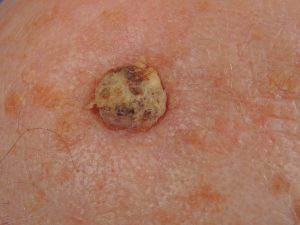 Squamous cell carcinoma (SCC) is our second most common type of skin cancer. It has a similar growth pattern and treatment outcome to a BCC but is more likely to spread to other parts of the body if left untreated. Occasionally they can also act aggressively and spread at an earlier stage.
Squamous cell carcinoma (SCC) is our second most common type of skin cancer. It has a similar growth pattern and treatment outcome to a BCC but is more likely to spread to other parts of the body if left untreated. Occasionally they can also act aggressively and spread at an earlier stage.
A SCC can appear as flat, scaly skin patches, open sores, raised red lumps or look like a wart. While some have crusty, bloody or oozing patches, this type of skin cancer can also resemble mostly normal skin.
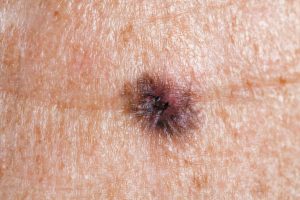 Melanoma is less common than the others and behaves very differently. It can grow quickly and therefore needs to be treated as early as possible.
Melanoma is less common than the others and behaves very differently. It can grow quickly and therefore needs to be treated as early as possible.
Melanoma develops from melanocytes that start to grow and divide more quickly than usual and spread into the surrounding surface layers of skin. When they grow out of control, they usual look like a dark spot or an unusual-looking mole. If not removed, these cells can grow down into the layers of the skin, reaching tiny blood vessels
and lymphatic vessels which means they can to travel to other parts of the body.
Why are golfers so vulnerable?
People who enjoy being outdoors, have fair or red hair, lots of moles or a family history of skin cancer, are the most at risk. But golfers are particularly susceptible because of three pivotal factors…
When: It’s the time we play our rounds. It can often lead to prolonged sun exposure during the hottest time of the day
Where: Golf courses provide little shade and grass, water and sand is highly reflective for ultra-violet light
How: Re-applying sunscreen is just as important as putting it on in the first place but players will avoid this fearing they will get a greasy grip.
Ultimately, we all love to play this sport in the sun and will spend prolonged time in it when we do – even when we’ve finished the round.
Why is the message still not hitting home?
We’ve carried out lots of research, talking to golfers around the UK regarding their habits and how they feel the sun impacts their health.
Many are in denial of the facts or the need to wear sun protection, which is still a common trend of the general population.
We hear a lot about how applying sunscreen can give a ‘greasy grip’ and this is something we have identified in our campaign.
We are working with Solar Buddies Sport, a sunscreen applicator brand, to encourage golfers to use sunscreen and keep their hands dry.
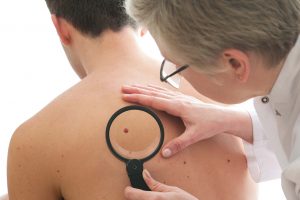 Lots of golfers have habits that stretch back to childhood. Apart from age spots, rough patches, wrinkles and general sun damage, they feel they are fine.
Lots of golfers have habits that stretch back to childhood. Apart from age spots, rough patches, wrinkles and general sun damage, they feel they are fine.
They do not see skin cancer as a ‘dangerous cancer’, with many believing it is simply a small mole or patch that can be biopsied or burned off. This is not always the case. Skin cancer can be disfiguring, invasive and life-threatening – especially melanoma.
Those who feel their skin is ‘seasoned’ from years of exposure, or protected by a base tan, need to look closely at their skin and see the damage in perspective.
The highest mortality rates from melanoma are in older men, who are less likely to use sunscreen, check their skin, or visit their GP with a concern. There is definitely a message there.
The importance of skin checking
With all skin cancers, the most common sign is a ‘change’ of an existing mole or lesion or a new one, so it’s important to get to know your skin and what it looks like normally. Check your skin on a regular basis when you are in the bath or shower. To see difficult to reach areas use a mirror, or ask your partner or a friend to check these areas of your skin.
Get into the sun protection habit
When you’re focused on your swing, you’re not thinking about your skin, and this is a very real issue. However, reducing your risk of skin cancer, should be just as important as lowering your handicap.
To help you achieve this, the Slip! Slap! Swing! campaign provides the following five key campaign tips:
- Keep sunscreen (SPF30+), sunglasses, a hat and large umbrella in your kit bag.
- Apply SPF30+ at least 20 minutes before teeing off to ensure it is effective.
- Reapply SPF30+ every two hours or around the 8th or 9th hole.
- Use a chubby sunblock stick to protect lips, nose and ears and a sun applicator to avoid a greasy grip.
- Check skin every month or so and if you spot any changes, visit your GP immediately.
How can club managers spread the message?
You have an important role.
Reminders regarding the UV Index and general weather could be printed off each day – as in hotels – and placed in reception.
Information can be sent to members in newsletters, on the club website and on social media, and posters can be pinned in changing rooms.
Offering free sunscreen to players that forget theirs is a good move. They say you never really get skin cancer until you get it, so let’s keep this in mind and become more sun smart.

Case study
‘I consider myself lucky and so thankful for going to my GP when I did’
Kenton Wright, head professional at Driffield Golf Club, in East Yorkshire, has spent three decades in the sun. He’d never suffered from extreme sunburn, but had little regard for sun protection.
“In 2015 I noticed a small mole on my right forearm, very slowly increasing in size and shape. Initially I thought nothing of it, however on particularly hot day I’d make sure the area was well protected with sunscreen.
Over time I began to wonder whether to have it looked at; just a niggle at first, but the noise in my head got louder. I saw my local GP and he checked it against a list of possible cancerous moles. Having decided it was worth a second opinion, I was referred to my local hospital, where the specialist removed it and sent it away for analysis.
Some seven days later (which felt a whole lot longer), I was asked to return to the hospital to be informed I had melanoma; the most dangerous form of skin cancer, which if not treated early could travel to my organs. Not a great day. I did my research and realised quickly how aggressive it was and how common it was becoming. I also realised that by simply using sun protection I could have avoided it and wished desperately I’d been more aware.
Surgeons began by removing a larger area to make sure the cancerous skin was completely clear. None of the procedures were particularly uncomfortable, but it was an uncertain and stressful time for both myself, and my family.
On recognition of my condition, I have had consultations with suitably qualified staff to ensure I had no further developing melanomas and to advise me on how I need to be more aware of the risks and also be mindful that it could return.
I now use an SPF50 sunscreen and continue to have regular check-ups, as well as checking my own skin – something I should have got into the habit of years ago.
I consider myself lucky and so thankful for going to my GP when I did. Apparently, the skin has three layers and my melanoma had only penetrated the first; in other words, I caught it early before it travelled, so effectively that trip to my GP saved my life.
My advice is that if you notice a changing mole or are worried about a new lesion, take professional advice, immediately. I also recommend upping your game when it comes to sun protection – why wait until you get a cancer diagnosis to start looking after your skin?”
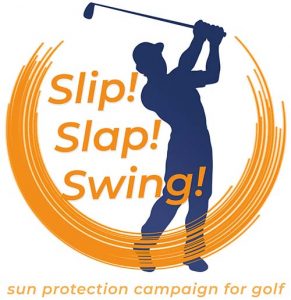 Launched this year by the Melanoma Fund, Slip! Slap! Swing! is a sun protection campaign for golf, raising awareness of the importance of sun protection and skin checking. Offering advice and tips, the resource aims to educate on the risks of sun exposure, helping keep golf a healthy sport for everyone. For more information on the campaign, visit melanomafund.co.uk/golf-live
Launched this year by the Melanoma Fund, Slip! Slap! Swing! is a sun protection campaign for golf, raising awareness of the importance of sun protection and skin checking. Offering advice and tips, the resource aims to educate on the risks of sun exposure, helping keep golf a healthy sport for everyone. For more information on the campaign, visit melanomafund.co.uk/golf-live
By GCMA
